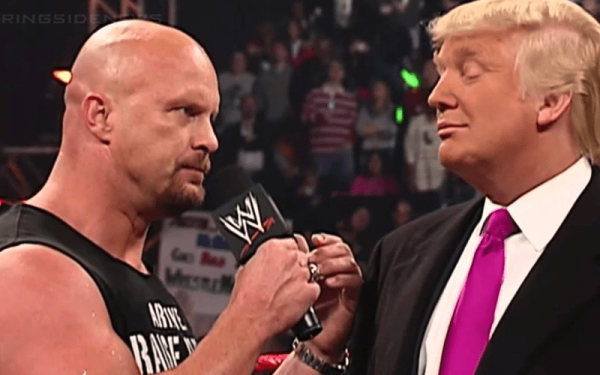“Stone Cold” Steve Austin and Donald Trump in a World Wrestling Entertainment performance in 2007
On April Fool’s Day 2007, larger-than-life wrestling tycoon Vince McMahon was attacked, held down, and shaved bald by a property developer before 80,000 baying onlookers. He had lost “The Battle of the Billionaires” at Wrestlemania, the biggest event in his World Wrestling Entertainment’s annual calendar, in a showpiece of orchestrated chaos.
Thirteen years later, McMahon’s assailant sits in the Oval Office struggling to guide the US through the deadliest pandemic in living memory. The WWE is staging live matches, in complete disregard of medical guidelines.
This April the company was listed, alongside health clinics, food producers, and energy services, as an “essential business” by the state of Florida. It has exercised this privilege brazenly with its moneymaking spectacles. Forced to defend his actions, McMahon insisted that the WWE is “woven into the fabric of society”.
Saturday’s WWE episode from Florida:
Wrestling as American Values
Vince’s statement is not as bizarre as it might initially sound.
The WWE’s dogged refusal to disrupt “business as usual” not only epitomizes the Trump Administration’s approach to the COVID19 pandemic. It also reveals how the nation sees itself in this time of crisis.
Professional wrestling occupies a peculiar space between sport and soap opera. Although match outcomes are predetermined, wrestlers — or “superstars” as they are referred to in the WWE — perform astounding feats of athleticism. Gymnastics and theater come together in an extravagant pantomime of pain.
But beyond the bulging biceps and steel chairs, beyond the stories of treachery and triumph, the WWE’s twice-weekly shows paint a unique portrait, perhaps a caricature, of US national identity.
Personified through costume, speech, and behaviour, wrestling’s on-screen heroes tend to embody the values upon which American society is founded: hard work, individualism, and freedom. Take a cursory glance at the company’s household names across three generations, from John Cena to “Stone Cold” Steve Austin to Hulk Hogan, and you will see a flag-waving, working-class, white American patriot whose never-say-die attitude propels him to the top.
As the company rose to success during the bipolar Cold War years, the virtuous all-American hero would face off against a dastardly, exotically-accented villain. Decades later, the format remains virtually unchanged.
Russian bruisers (Nikolai Volkov, Vladamir Kozlov), Irish brawlers (Finley, Seamus), “Samoan Savages” (Sam Fatu, Umaga), and urban “street gangs” (Cryme Tyme, Los Buricoas), among others, make up a medley of lazily-written antagonists hell-bent on crushing the American Dream.
Tired stereotypes, cultural appropriation, even blatant racism; it’s all part of the fun. Detailed characterization of these villains is clearly unimportant: they are un-American and must be stopped at all costs. So when John Cena grapples with the Putin-worshipping “Bulgarian Brute”, Alexander Rusev, their battle is both physical and symbolic.
Over time, Hispanic, Asian and African-Americans have been brought, at least superficially, under the Stars and Stripes. Hard-working, assimilated wrestlers like the Uso twins, Mustafa Ali, and the company’s first African-born champion, Kofi Kingston, have increasingly, albeit sporadically, broken the shackles of stereotype and reached pinnacles that were out of reach 20 years ago.
It is the “real foreigners” who remain wrestling’s fail-safe punching bags. Whether British or Mexican, Canadian or Swiss, international wrestlers are often little more than cannon fodder to challenge, but ultimately capitulate to, their superior American adversaries. They are the supporting cast, adding decoration to these mini-sagas of US pre-eminence.
US Superiority v. Coronavirus
This image of America and the wider world, captured between the ropes, has a greater significance than entertainment. The belief that the US stands head and shoulders above the rest of the world is deeply ingrained within the American psyche.
And this exceptionalism does not only underscore the narratives of the WWE, it drives decision-making at the highest level. Indeed, this unwavering perception of self-superiority and self-singularity has dictated the Trump Administration’s approach to COVID-19.
In February, Donald Trump used his platform to declare Coronavirus a “hoax”, assuring citizens that “like a miracle, it will disappear as the heat comes in”. He then drew comparisons to seasonal flu, downplaying the threat of the virus in flagrant disregard of his senior medical advisers.
When Trump finally acknowledged the pandemic’s severity, he clamoured for a leadership role in the global response. He proclaimed himself the “world leader in testing”, anointed himself “king of ventilators” and declared the US death rate “the lowest in the world” — none of which was true. No matter: White House officials offered “large sums of money” to buy exclusive US access to a potential vaccine developed in Germany.
With his WWE-style braggodocio, Trump certainly does not stand apart from America. He is the 21st-descendant of the 17th-century America as a shining “city upon a hill”, a “beacon of hope” for the rest of the world to follow. The “American Good vs foreign Evil” narrative might have been lifted from an episode of Monday Night Raw, but it has effectively communicated Trump’s brand of populist nationalism, appealing to exceptionalism at the heart of the American identity.
The WWE, an “official business”, is a megaphone for the current administration. Trump recognized this when he named Linda McMahon, Vince’s wife, as head of the Small Business Administration. Ron DeSantis, Republican Governor of Florida and a Trump ally, rewarded this with his green flag to the company to repeatedly flout medical guidelines on live television.
There is only one difference between them. In the WWE, the spectacle’s outcome is predetermined. In Trump’s spectacle, November’s electoral climax is still unknown — how it is written could be even more important for America than Wrestlemania.

